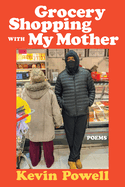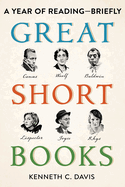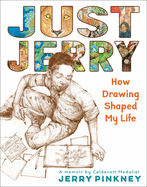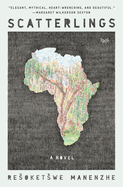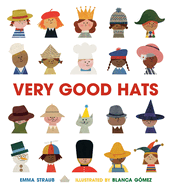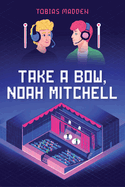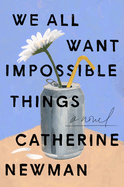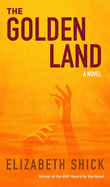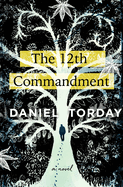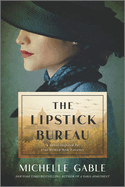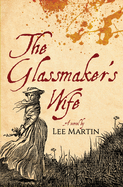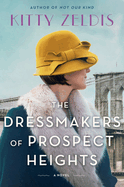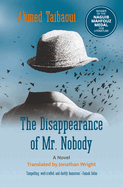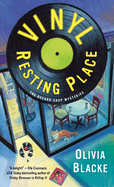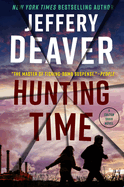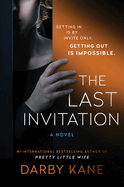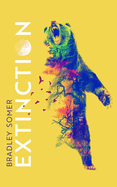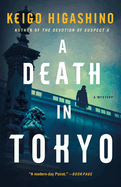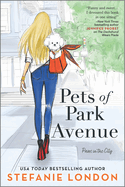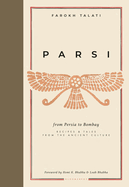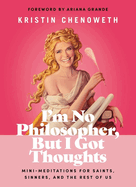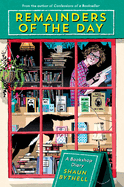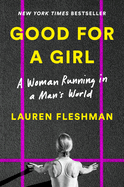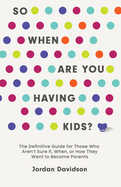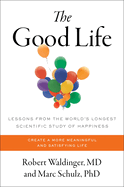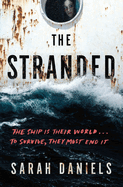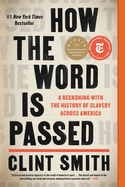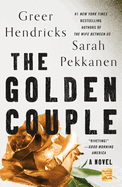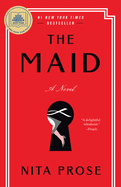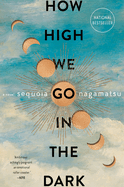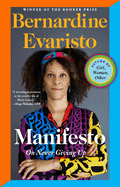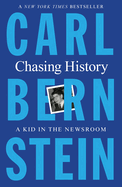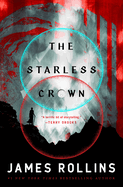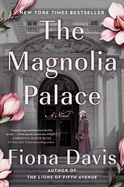Friday, January 20, 2023
In this week's issue, you'll find reviews of Kevin Powell's Grocery Shopping with My Mother, 36 "smooth poems with a distinctive voice" that mingle "the personal and the political, the praiseworthy and the reprehensible"; Kenneth C. Davis's "delightfully accessible" Great Short Books, 58 fact-filled reviews of "a smorgasbord of titles sure to entice readers"; and Just Jerry, the "resplendent and candid" memoir that Caldecott Medalist Jerry Pinkney was working on during the decade before he died. And so many more!
In The Writer's Life, poet, novelist and journalist Eileen Myles discusses Pathetic Literature, an anthology they edited of 106 pieces, ranging from poetry to prose, including lesser-known works by the likes of Rumi, Kafka and Gwendolyn Brooks--plus the book that saved her life.
Scatterlings
by Rešoketšwe Manenzhe
South African poet, short story writer and novelist Rešoketšwe Manenzhe traces the multiple perspectives of one troubled family's untethering in Scatterlings, her lyrical and devastating debut novel. Interracial married couple Abram and Alisa have a troubled marriage before South Africa's 1927 Immorality Act. But when the new Act criminalizes their union and their children, Alisa becomes more despondent than ever as Abram struggles to protect his family. Soon, Alisa makes a devastating decision that will forever alter their lives. And in the aftermath, Abram and his daughter Dido must navigate this new world together--and apart.
Manenzhe deftly weaves the divergent points of view and succeeds not only in depicting a complicated marriage trapped within impossible circumstances, but also in illuminating the systemic and generations-long forces at play in intimate relationships. By beginning primarily in Abram's perspective, readers share his horror at what Alisa is capable of. And yet with every added voice, the novel invites readers to become entangled in the baggage--interpersonal, cultural, economic and political--that Alisa and Abram's marriage carried, despite Abram's almost simplistic understanding of it. Although the novel never shies away from the heaviness of these complexities, particularly in Alisa's illuminating diary entries that flip the script of Abram's perception of their marriage, it also finds a tenderness in the trust that begins to build between Dido and her unlikely caretaker. Ultimately, Manenzhe's portrait of a family in crisis manages to speak to the often-unspeakable divides that underline race relations and marriage alike. --Alice Martin, freelance writer and editor
Discover: Quiet, poetic and emotionally resonant, Scatterlings explores both the intimate heartache and widespread impact of colonial violence.
The Boy and the Dog
by Seishu Hase, transl. by Alison Watts
"There was a dog," opens Seishu Hase's poignant, loving novel, set six months after the 2011 triple catastrophe in Japan (earthquake, tsunami and nuclear meltdown). His name, according to the collar on his gaunt, scabby body, is Tamon, possibly "after Tamonten... the guardian deity." Hase doesn't anthropomorphize the dog; instead, Tamon humanizes the strangers who temporarily get to call him family in The Boy and the Dog.
Each section of Hase's novel reveals the people the dog meets on what becomes a five-year journey across impossible miles. Tamon's comforting presence, brief as it may be, also recalls for each passing companion a beloved canine from the past. "The man" (from "The Man and the Dog") has resorted to illegal work, post-disaster, to help support his mother, who suffers from dementia, and his exhausted sister, the caregiver. "The thief" has been forced to survive by criminal means since childhood. "The couple" are a mismatched pair, the responsible wife continuously struggling with the husband's immature selfishness. "The prostitute" is barely enduring her horrific existence. "The old man" couldn't be lonelier. And then there's a silent boy.
The undeniable bond between human and animal is the heart of this affecting novel. Empathetic tears prove inevitable--tragedies are unavoidable, and the body count is surprisingly high--yet Hase manages to tell Tamon's story without ever resorting to excessive sentimentality. Originally published in 2020 in Japan and awarded the prestigious Naoki Prize, The Boy and the Dog sees its English-language debut thanks to a deft translation by Alison Watts. Pet owners will certainly be reminded to chip their furry children. --Terry Hong, BookDragon
Discover: The Boy and the Dog, an affecting novel first published in Japan about a dog searching for his special human after catastrophe, promises to induce tears, inspire empathy and swell hearts.
We All Want Impossible Things
by Catherine Newman
Catherine Newman (Catastrophic Happiness; Waiting for Birdy) blends sage wisdom and earnest good humor in her columns and memoirs, balancing difficult realities with the inherent joy and hilarity of life. In We All Want Impossible Things, her first novel, she brings something similar, offering readers a story that looks squarely at a terrible loss and still sees the beauty.
It's hard to recommend a novel about helping your best friend die. But Newman makes it more than possible, because readers will fall in love with Ash and Edi and their irrepressible friendship, even as Edi suffers and fades--and then is gone. Of course, life doesn't stop because someone is dying, so Ash is also contending with parenting almost-adult children; the end of her long, mostly good marriage; and her shifting sense of self in the midst of so much turmoil. These other elements are important (though some might strain credulity) and often very funny, but it is the daily experience of loving another person, despite knowing they will die, that makes this novel shine.
After Edi dies, Ash reflects: "Here we are, hurling ourselves headlong into love like lemmings off a cliff into a churning sea of grief. We risk every last thing for our heart's expansion, even when that expanded heart threatens to suffocate us and then burst." Newman's great gift is in telling stories that are true and universal and bitter and tender all at once, and We All Want Impossible Things is exactly that. --Sara Beth West, freelance reviewer and librarian
Discover: In her first novel, Catherine Newman balances tragedy and hilarity and makes readers fall in love with Ash, Edi and their unforgettable friendship, even as Edi suffers and fades in hospice.
The Golden Land
by Elizabeth Shick
Expat and development worker Elizabeth Shick mines the six years (2013-2019) she spent living in Yangon, Myanmar, for The Golden Land, an insightful debut novel highlighting an extended Myanmar family scattered across East and West. Etta--a 30-something Boston labor lawyer raised mostly by her maternal Myanmar immigrant grandmother, who has recently died--is the story's linchpin. Parker, her younger sister, insists on returning Ahpwa's ashes to her homeland. Once there, Parker decides to stay in Myanmar, and concerned Etta follows. Looming over the sisters' return is a truncated family trip in 1988 after which their family irreversibly splintered. Myanmar's recent vicious, complicated politics provide the backdrop to significant discoveries--for both characters and readers.
Shick plays deftly with dual narratives over three parts: Part I introduces the characters in 2011 Boston, jumping back to 1988 Rangoon, Burma; Part II switches to 1988 Boston and later, alternating with 2011 Yangon, Myanmar (notice the name change for the same geographic location); Part III nimbly merges both timelines. "Writing... was a labor of love for my host country," Shick explains in her author's note, "undertaken in a spirit of respect and solidarity--my humble attempt to communicate the fascinating, cautionary history of Myanmar and the remarkable resilience and ingenuity of the Myanmar people." Shick's earnest esteem helps diminish the occasional first-book challenges of a narrative that repeats and drags; her protagonist's tedious and naïve self-absorption is tempered by more convincing fellow characters. Illuminating moments--puppetry, folklore, pivotal events, quotidian contemporary life--tilt Shick's fiction firmly toward respect and appreciation. --Terry Hong, BookDragon
Discover: A career expat's debut novel skillfully explores Myanmar history and culture through an extended family split across the world.
The 12th Commandment
by Daniel Torday
In his third novel, The 12th Commandment, Daniel Torday (Boomer1; The Last Flight of Poxl West) marries an intriguing murder mystery to an exploration of the power of charismatic religious leaders and an inquiry into aspects of Kabbalistic thought. It's an ambitious project, but he's clearly done his homework and has the self-assurance to execute the task he's set for himself with both substance and style.
Ezekiel (Zeke) Leger, a New York writer and editor with a national magazine, returns to the small Central Ohio town of Mt. Izmir, where he attended college, for the funeral of one of his classmates who's taken his own life. But that sudden death is not the only puzzle that will consume him. Almost simultaneously with his arrival, he hears about the murder of Osman Fritzman, the 16-year-old son of the leader of a sect that blends Jewish and Muslim practices in a nearby rural enclave. The leader, who goes by the name Natan of Flatbush and claims prophetic powers, has been convicted of the crime, in a prosecution led by Zeke's ex-lover, Johanna Franklin. Natan awaits the outcome of his appeal in prison. Once Zeke persuades a skeptical editor to greenlight an investigation into the sect and the murder, he must overcome the initial resistance of the religious community--known as the Caves--to allow access to an outsider.
Though Torday, a two-time winner of the National Jewish Book Award for fiction, brings the mystery of Osman's death to an appropriate conclusion, it's clearly subordinate in importance to the story of Natan and his followers. As long as there are fervent believers, some will strive to transcend the boundaries of conventional faith. Only time and circumstance determine how their quest will end. --Harvey Freedenberg, freelance reviewer
Discover: In this ambitious and successful novel, Daniel Torday deeply explores life in a heterodox religious sect in rural Ohio set against the backdrop of a mysterious murder of one of its number.
The Lipstick Bureau
by Michelle Gable
As World War II drags on, Czech American lawyer and journalist Nikola "Niki" Novotná is recruited to the Office of Strategic Services. Disappointed at first by her new assignment, Niki nonetheless comes to relish her role in Morale Operations. Michelle Gable (The Bookseller's Secret; The Book of Summer) follows Niki's twisting journey to create anti-Nazi propaganda and discover her family's fate.
Gable opens The Lipstick Bureau, her gripping sixth novel, in 1989, as Niki and her grown daughter, Andrea, attend a dinner in honor of "The Ladies of the O.S.S." Though Andrea knows vaguely that her mother worked in intelligence during the war, the evening prompts Niki to reveal more of her wartime story--including some shocking family secrets.
Most of Niki's work, and the novel's action, takes place in occupied Rome, flooded with soldiers from various Allied forces and Italians barely scraping by. Gable creates engaging characters, each with their own motivations for working in a backwater branch of intelligence: all of them, Niki included, are escaping difficulties in their prewar lives. Niki eventually comes up with a brilliant (if morally complex) scheme to use German POWs to drop their propaganda behind enemy lines. Practical and hardheaded, she forges ahead despite resistance and threats from her superiors, convinced that her plan will help hamstring the Nazi forces as the war wanes.
Inspired by real-life figures such as Barbara Lauwers and New Yorker cartoonist Saul Steinberg, The Lipstick Bureau is a cracking good story, and a tribute to the courage and ingenuity of intelligence agents whose work has remained secret for so long. --Katie Noah Gibson, blogger at Cakes, Tea and Dreams
Discover: Michelle Gable's gripping sixth novel explores espionage, propaganda and friendship in occupied Rome during World War II.
The Glassmaker's Wife
by Lee Martin
In a haunting novel of desire, deception, tragedy and, ultimately, forgiveness, a teenage girl's quest for belonging places her in the center of a sensational murder trial in 1844 Heathsville, Ill. Eveline Deal recalls her part in that fateful summer in The Glassmaker's Wife by Pulitzer Prize-winner Lee Martin (The Bright Forever; Yours, Jean; The Mutual UFO Network), based on the true story of one of the first women executed by hanging in the United States.
Eveline, an impressionable 15-year-old, and her mother barely get by after her "lowlife" father leaves, but she finds the comfort of a happy home in her role as hired girl at the house of Leonard and Elizabeth Reed. After chores, she and the beautiful "Miss Betsey" read from Godey's Lady's Book, and "the Mister" invites her to learn his glassblowing craft. But Eveline is also burdened by the couple's secrets, including Betsey's flirtations with a shopkeeper. When the Mister dies suddenly and the coroner rules it poisoning, Betsey is charged with murder and Eveline is a key witness. Did she see Mrs. Reed add a powder to her husband's coffee?
Eveline, who sincerely believes in the anticipated Ascension to Heaven, is faced with the truth that what she says--and doesn't--will determine Betsey's fate and her own reputation. Abundant imagery and the dialect of small-town America in the 1840s combine with a credible mystery that involves the chemistry of lethal elements and human motivation. In despair, young Eveline knows "everything she did or didn't do, everything she allowed--it all touched the lives of those around her." Martin writes with sympathy for those lives, too. --Cheryl McKeon, Book House of Stuyvesant Plaza, Albany, N.Y.
Discover: A hired girl is thrust into the heart of a sensational 1844 murder trial in a Pulitzer Prize-winner's haunting novel about the consequences of desire and deception.
The Dressmakers of Prospect Heights
by Kitty Zeldis
Kitty Zeldis (Not Our Kind) expertly braids the lives of three women in her second historical novel, The Dressmakers of Prospect Heights. Catherine Berrill, happily wed to a kind man, is desperate for a child to complete her vision of a family. But a stillbirth leaves her devastated, both unable and unwilling to move forward. Down the street, dressmaker Beatrice Jones, newly arrived from New Orleans, has a carefully guarded secret that connects her to Catherine's past. Beatrice's young ward, Alice, is gifted with a needle but unschooled in the ways of the world, and her impulsivity combined with her naivete will lead to unforeseen consequences for all three women.
Zeldis brings 1920s Brooklyn to vivid life, rendering the neighborhood of Prospect Heights and the one-of-a-kind creations in Bea's shop in lush detail. She takes readers back to Bea's previous life (and career as a madam) in New Orleans, and even farther back to her childhood in Russia, weaving the flashbacks into the main narrative. Zeldis sensitively explores the more difficult sides of motherhood and daughterhood, including Catherine's prickly relationship with her mother, Meredith; the realities of postpartum depression; and the limited options for women lacking either husbands or money. The complex motivations of all three women--guilt, love, loneliness, self-preservation and revenge--drive Zeldis's story, resulting in an odd but unbreakable bond between Bea, Alice and Catherine. Though she doesn't shy away from challenging topics, Zeldis's novel, like the relationships at its center, ends on a note of beauty and hope. --Katie Noah Gibson, blogger at Cakes, Tea and Dreams
Discover: Kitty Zeldis's second historical novel explores the complex connections between three women in 1920s Brooklyn.
The Disappearance of Mr. Nobody
by Ahmed Taibaoui, transl. by Jonathan Wright
The Naguib Mahfouz Medal for Literature--which annually enables the best contemporary novel written in Arabic to be translated into English--introduces U.S. readers to Algerian professor Ahmed Taibaoui's enigmatic The Disappearance of Mr. Nobody. Award-winning former journalist Jonathan Wright smoothly translates Taibaoui's piercing English debut.
Hardly more than 100 pages, the spare novel is divided almost exactly in half. The first, "The Man Who Took His Face Off and Left," centers on a disgruntled young man in Rouiba, Algeria, who is responsible for the care of an elderly man quickly fading into dementia. The old man's son has left for Germany, becoming little more than a voice on the phone, leaving the unnamed narrator seemingly trapped: "I'm a filthy slave that no one knows or cares for, and that suits me fine." And yet he manages to tally up a hefty café bill, charm the household servant and propose marriage to a nurse. And then he disappears off the page. In part two, "Hell Looks Out of the Window," self-opined "brilliant detective" Rafik Nassiri takes on the mysterious case: "He might have existed but in effect he doesn't exist now," he initially insists. Nassiri's declaration isn't wrong, but his efforts continue anyway--yet to what end?
Taibaoui writes with raw urgency--the young man's threats, the old man's demise, the detective's failures--even as his Mr. Nobodys seem to multiply in a society where no one seems to truly know, care about, understand or empathize with anyone else. Part mystery, part confession, part parable, Taibaoui's scathing commentary on nameless, lost souls will undoubtedly find universal resonance. --Terry Hong, BookDragon
Discover: This award-winning Algerian novel in its English debut, the story of various nobodies, is an accurate, biting commentary on contemporary society.
Mystery & Thriller
Vinyl Resting Place
by Olivia Blacke
Juniper "Juni" Jessup has just moved back to her Texas hometown near Austin to open Sip & Spin, a record store and coffee shop she co-owns with her sisters. But when a local young woman is found dead in the shop after the opening-night party--and their uncle Calvin, a suspect, skips town--Juni and her sisters investigate. Olivia Blacke, who charms readers with her Brooklyn Murder Mystery series, launches Record Shop Mysteries, a cozy series, with Vinyl Resting Place.
Blacke (No Memes of Escape; Killer Content) sets up her series with an engaging ensemble cast, including Juni's two sisters, Tansy and Maggie; their mother, Bea; the shop cat, Daffy (short for "Daffodil"); and Juni's high school BFF-turned-mail carrier, Teddy Garza. Less engaging is Juni's overbearing ex, Beau Russell, now the cop in charge of the murder investigation. The narrative, told in Juni's snappy first-person voice, emphasizes the quirky small-town character of Cedar River, as well as the tight bonds among Juni's family and friends. Although the mystery plot, including the motive for murder, is a bit thin in places, readers will enjoy Juni's determination to exonerate her uncle, as well as the sisters' commitment to their new business venture. Punny coffee names ("Excuse Me While I Kiss the Chai") and Calvin's joke business, Prankenstein, add liberal dashes of humor. The mystery's solution temporarily lands Juni in hot water, but all three Jessup sisters will presumably be back for more adventures. Vinyl Resting Place is a fun addition to Blacke's growing library of stories featuring plucky amateur sleuths. --Katie Noah Gibson, blogger at Cakes, Tea and Dreams
Discover: Olivia Blacke's quirky cozy mystery series features three sisters running a record shop in their Texas hometown.
Hunting Time
by Jeffery Deaver
The ferocious action of Hunting Time starts immediately. Jeffery Deaver (The October List; The Kill Room) melds high-tech maneuverings with believable characters in his fourth exciting thriller starring professional reward seeker Colter Shaw. Entrepreneur Marty Harmon hires Shaw to find a stolen portable nuclear power plant that Harmon's firm developed, which would allow emerging countries reliable sources of energy and improve residents' lives. Through a cunning bit of trickery Shaw retrieves the device, called the Pocket Sun, from a greedy employee and his accomplices. Then Harmon has a second job for Shaw: find and protect the device's inventor, Allison Parker, and her 16-year-old daughter, Hannah. Allison's ex-husband, former cop Jon Merritt, has been released early from prison, and they fear for their lives. Merritt, convicted of attempting to murder Allison, swore he would kill her when he was released. Mother and daughter have gone off the grid, but one of Shaw's skills is finding those who don't want to be found. With the help of Harmon's security chief, Sonja Nilsson, Shaw traces Allison and Hannah, trying to stay ahead of Merritt and two other killers also on the trail.
Deaver's elaborate narrative in Hunting Time doles out well-timed surprises for full impact while delving into Shaw's background, which includes his upbringing by a survivalist. Shaw, an engaging hero, constantly evaluates how to survive a situation, assessing the odds for which methods work best--and he's right at least 99% of the time. --Oline H. Cogdill, freelance reviewer
Discover: Colter Shaw returns for an action-packed thriller in which the professional reward seeker tracks a mother and daughter on the run from killers.
The Last Invitation
by Darby Kane
Righteousness and vengeance intertwine when a select group of influential women decides to mete out justice in The Last Invitation, Darby Kane's third gripping thriller that features myriad believable twists. In Chevy Chase, Md., a charitable organization called the Sophie Foundation funds special projects for women's health and welfare. But a smaller group within the foundation has a different approach: killing men whose behavior they consider vile. These women's actions have repercussions for Gabby Fielding, who's in a custody battle with her ruthless ex-husband, Baines, and for divorce lawyer Jessa Hall, who is constantly second-guessed by her smug male supervisors. Arriving at her ex-husband's house to discuss the education of their teenage daughter, Gabby finds Baines dead from a gunshot wound. The police rule the death a suicide, but Gabby believes he was murdered. She begins her own investigation. Reeling from the problems with her latest case against a powerful man, Jessa receives an invitation to the Sophie Foundation. Gabby's investigation unwittingly veers close to its members, enraging them, while Jessa begins to regret becoming a part of this well-connected group. The Sophie members don't abide interference; leaving the group isn't an option.
Succinct chapters alternate between Jessa, Gabby and others, giving in-depth views of each character while delving into their motives. Neither Gabby nor Jessa are particularly sympathetic, but Kane (The Replacement Wife; Pretty Little Wife) skillfully makes their situations into ones with which readers can empathize. The cerebral action generates from several women's rationales, as the Sophie members ignore the collateral damage suffered by ex-wives and children. --Oline H. Cogdill, freelance reviewer
Discover: Women in a secret group administer their own brand of justice in this gripping, cerebral thriller.
Extinction
by Bradley Somer
The job of wildlife ranger Ben is to protect the last bear on earth, but Arnott Harbron has his sights set on killing the bear before leaving the planet. A clash of wills is inevitable in Bradley Somer's Extinction, a stupendously written survivalist adventure. Earth's climate is nearly unlivable. Anyone who can afford the ticket to the Copernicus lunar colony has already left or will be blasting off soon. But not Ben. He works for the Ursa Project, an underfunded effort to keep The Boss, the last bear on the planet, alive. Ben lives in the wild and monitors The Boss via a microchip implant. It's brutally cold in this mostly uninhabited landscape, so he's extremely surprised and suspicious to find heavily armed Arnott and his son, Vito, in the middle of the woods. Arnott is affable toward Ben but also clear about his plan to kill The Boss before catching a ride to the moon. Arnott's hired guide turns out to be Tomos, Ben's former supervisor. The situation worsens when the chip in Ben's pack sounds an alert that The Boss is nearby. Ben narrowly escapes the hunters as they try to take the chip from him. It's no longer The Boss's life that's on the line; it's Ben's too. Violence, unexpected betrayal and spilt blood colors this intense story of survival.
Somer (Fishbowl; Imperfections) takes a simple pro-environmental argument and hides it deep inside a thrilling survival-of-the-fittest action story that could (and should) very likely cause people to take climate change more seriously. --Paul Dinh-McCrillis, freelance reviewer
Discover: A wildlife ranger must put his own life on the line to save the last bear on the planet in a thrilling survival story.
A Death in Tokyo
by Keigo Higashino, transl. by Giles Murray
Popular Japanese mystery author Keigo Higashino (Newcomer; Under the Midnight Sun; A Midsummer's Equation) presents the third novel in the Kyoichiro Kaga series to be translated into English, A Death in Tokyo. Readers of international police procedurals and armchair travelers are sure to enjoy this jaunt to the vibrant city of Tokyo.
A statue of a kirin, a mythical Japanese creature, stands guard on the Nihonbashi Bridge. One night, a man assumed to be drunk staggers to a stop beneath it, and collapses, but when an officer attempts to hurry him along, he realizes the man has been stabbed. A few minutes later and several streets away, Fuyuki Yashima is hit by a car and falls into a coma. Police officers investigating the accident are stunned to discover the wallet of the murder victim in Yashima's possession. Detective Kaga is assigned to the case and quickly discovers that the deceased, Takeaki Aoyagi, was a fairly important businessman. Did Yashima kill him? Simply rob him? Is Yashima truly the criminal he appears to be? Kaga is anxious to find the answers before Yashima comes out of his coma. Tracing the recent activities of the victim and Yashima sends Kaga across the city on a quest for answers.
A Death in Tokyo, translated by Giles Murray, is an excellent--and surprising--mystery. Kaga is a thoughtful investigator, and the families of Yashima and the dead man are filled with interesting characters, keeping readers guessing about motivations until the final pages. --Jessica Howard, freelance book reviewer
Discover: A man is stabbed to death and the main suspect lies in a coma, forcing Detective Kyoichiro Kaga to piece together both of their lives in this intriguing Japanese mystery.
Romance
Pets of Park Avenue
by Stefanie London
Stefanie London (Kissing Games; Forever Starts Now; Bad Bachelor) delivers a hearty helping of dogs and romance in her endearing second entry in the Paws in the City series, Pets of Park Avenue. Scout Myers, a 26-year-old New Yorker, works for a premiere pet social media and talent agency, run by her successful best friend Isla, the winning protagonist from The Dachshund Wears Prada, the first novel in the series. When Scout is tasked with doing a makeover of a socially connected Bichon Frise for a photoshoot, things go awry: the dog's cottony-white coat is suddenly transformed into hot pink. Scout, in a bind, is left no choice but to ask her ex, Lane, if she can borrow his Bichon--a well-behaved near-lookalike named Twinkle Stardust (who goes by "Star")--to serve as a stand-in. Lane and Scout had a whirlwind romance and marriage that flopped five years ago, and they never officially divorced. What starts as a one-shot deal to borrow Star soon reunites the former lovers. Lane, a tech genius who runs a multimillion-dollar company, still has a soft spot for Scout, who left him after only one month of marriage because she felt she could not measure up to him and his ideals. Lovable Star serves as a bridge in this smart, sexy rom-com that unravels the couple's challenging personal pasts and explains why things soured between them. Can they make amends?
London's likable characters resonate with hidden depths as she mines their hearts to deliver a fun, revealing story that will have readers rooting wholeheartedly for love--and dogs--to conquer all. --Kathleen Gerard, blogger at Reading Between the Lines
Discover: A fun, endearing rom-com about how an estranged couples' dog reunites them, forcing them to reconcile their feelings for each other.
Food & Wine
Parsi: From Persia to Bombay: Recipes & Tales from the Ancient Culture
by Farokh Talati
Parsi: From Persia to Bombay: Recipes & Tales from the Ancient Culture by Farokh Talati opens with a tribute to the Parsi people, a religious group that settled in India in the seventh century after fleeing persecution in their Iranian homeland. Talati, an acclaimed British-Indian chef and member of the Parsi diaspora, captures the joyful spirit of community in his debut cookbook, honoring Persian and Indian flavors in his everyday recipes as well as festive dishes designed for sharing. With user-friendly recipes enhanced with photos and family anecdotes, Talati invites readers to sample potent spice mixes and vibrant pickles, including the charmingly named "wedding pickle." Vegetable, rice and lentil recipes abound, while meat and fish play an integral part in the curries, kebabs and pulao dishes that Parsi celebrates. Talati's version of kedgeree, with "a hint of Parsi flair," includes saffron, turmeric and basmati rice scented with cloves and cinnamon. Sweet-toothed readers are in for a treat. A chapter devoted to "sweet things and ice creams" is followed by a tempting selection of biscuit (cookie) and cake recipes. The decadently layered Knickerbocker Glory, a throwback to Talati's childhood, plays a starring role.
The head chef at London's St. John Bread and Wine, Talati hopes to open a Parsi restaurant and preserve the venerable food traditions of the world's rapidly dwindling Parsi population. His cooking philosophy is anchored in the belief that one should not hesitate to experiment beyond the prescribed borders of a given recipe. "Remember," Talati writes, "there is no right or wrong, only deliciousness." --Shahina Piyarali, reviewer
Discover: A British-Indian chef and member of the Parsi diaspora celebrates his community's food traditions through timeless recipes that are deliciously adapted for the modern home cook.
Nonfiction
Great Short Books: A Year of Reading--Briefly
by Kenneth C. Davis
Delightfully accessible, Great Short Books: A Year of Reading--Briefly presents 58 fact-filled reviews of short books, a smorgasbord of titles sure to entice readers. Kenneth C. Davis (Strongman), author of the Don't Know Much About series, despairs that "literary sizeism... exists against short fiction." At a book a week--Davis includes six "bonus" books--it's a reasonable expectation, he writes, that one could read these 58 titles, each 100 to 200 pages in length, in the span of a year. Davis, writing during the pandemic lockdown, was inspired by the Italian writer Boccaccio's Decameron, 100 brief tales completed in 1353 during the Black Death.
Davis lists his eclectic top 58 titles alphabetically and, without a chronological or thematic structure, each entry feels like a surprise. (An "arbitrary" choice was the exception of following Mrs. Dalloway with Michael Cunningham's The Hours, inspired by the Virginia Woolf novel.) Each review follows a pattern: first lines, plot summary ("NO SPOILERS!" Davis promises), an insightful author bio, a "why you should read it" critical analysis and "what to read next" by the same author. He includes men and women writers equally, "established classics" (Ethan Frome; The Great Gatsby) as well as "works that reflect the current atmosphere of politics and society" (Jamaica Kincaid's Lucy, for example). A passionate reader, Davis appends to his 58 reviews a short essay on titles he left out and his favorite 15 short books. Great Short Books, a satisfying read itself, is a useful addition to any collection, well beyond the suggested "year of reading." –Cheryl McKeon, Book House of Stuyvesant Plaza, Albany, N.Y.
Discover: This collection of 58 short reviews of short novels, which recommends reading the entire list in one year, also serves as a quick reference for readers' collections.
Biography & Memoir
I'm No Philosopher, but I Got Thoughts: Mini-Meditations for Saints, Sinners, and the Rest of Us
by Kristin Chenoweth
Pint-sized powerhouse performer and Emmy and Tony award-winner Kristin Chenoweth (A Little Bit Wicked) offers upbeat and heartfelt philosophical musings in I'm No Philosopher, but I Got Thoughts. Much of her philosophy is reminding readers there is rarely perfection: "no one gets through life perfectly in place like a bubble at the center of a carpenter's level," she writes. "Who would even want that?" But there are measures that can be used to help keep one's equilibrium, such as cultivating a circle of supportive friends and creating a lifestyle of self-care. Her Christian faith supports her, but she also discusses thinking beyond spoon-fed dogma and writes: "We should always be ready to question our faith."
Although she usually leans toward humor--"When in doubt: Think WW DOUBLE D! (What would Dolly do?")--Chenoweth also shares her own stories of growing up adopted and dealing with depression and loss. She writes of a longtime friend taking his own life during the Covid-19 quarantine. "The magnitude of this loss laid my bones bare," she writes. "The magnitude of my anger scared me." It took her a while to realize: "Pain is our invitation to the privilege of empathy. And loss--that brutal SOB--is evidence of love."
Her chapter on screwing up includes a hilarious tale of sending a basket of cookies and a note reading "Congratulations!" to what she thought was an event honoring an old friend, only to later find out it was the friend's funeral. This breezy and buoyant self-help guide should find a lot of eager followers. --Kevin Howell, independent reviewer and marketing consultant
Discover: Mixing humorous anecdotes with heartfelt advice, Kristin Chenoweth delivers an upbeat and thoughtful guide to finding joy in life.
Remainders of the Day: A Bookshop Diary
by Shaun Bythell
Difficult customers, colorful employees and contempt for "monopolistic American booksellers driving the rest of us to penury": it's all here in Remainders of the Day, Shaun Bythell's third diary about his experiences running Scotland's largest secondhand bookshop. Fans of the first two books will be charmed once again by Bythell's snark and dedication.
In 2016, Bythell (Confessions of a Bookseller; The Diary of a Bookseller) still fulfills orders and manages his rotating staff, the former being particularly challenging after Amazon suspends his account as an affiliate. Among the people in this third diary are Petra, an Austrian woman who "leans heavily towards conspiracy theories"--aircraft vapor sends mind-control chemicals to earth, for instance--and who "is convinced that she can make a living in this impoverished corner of Scotland by teaching belly-dancing." Familiar figures are back, too. They include Emanuela, known as Granny, the young co-worker with whom Bythell exchanges raised middle fingers in greeting every morning; Sandy the tattooed pagan, who "claims to be the most tattooed man in Scotland"; and Anna, Bythell's American former partner. And then there are the customers: the man who is shocked to learn Bythell doesn't have a café ("So, no refreshments at all?") and the woman who chastises him because "you don't have any books about cooking with roadkill"--and who just happens to have written an "excellent one" she wants him to stock.
Bythell shares one anecdote after another, all of them written with his delightfully caustic touch. Just another year in Scotland's national book town. --Michael Magras, freelance book reviewer
Discover: Remainders of the Day offers more anecdotes and colorful characters from a year in the life of Scotland's largest secondhand bookshop.
Good for a Girl: A Woman Running in a Man's World
by Lauren Fleshman
Lauren Fleshman, five-time NCAA running champion at Stanford University and two-time national champion at the professional level, always displayed obsessive dedication, commitment and drive. In her superb memoir, Good for a Girl, she opens a door into her athletic and personal life, baring honest, hard truths about her path to becoming "one of the most decorated American distance runners of all time." She also fearlessly exposes the often dark, demanding underbelly of female sports and how she believes it needs to be reformed.
Fleshman was born in 1981 and grew up in a middle-class family that ate dinner together every night. Fleshman's father was a contradiction: big-hearted and charismatic, gruff and hot-headed. But Fleshman's abiding love for him--and her constant seeking of his love and approval--became a driving force. Her father instilled principles of excellence that carried over into Fleshman's life--especially when she found sports. She was a gifted runner in middle school PE, but after being beaten by a boy in a school race, she started showing up late. The track coach gave Fleshman an ultimatum: he would waive her "punishment" of collecting 150 soda cans for recycling if she'd agree to compete in a track meet. This launched Fleshman into competitive running; she excelled throughout high school, college and beyond, was sponsored by Nike, and later became a sought-after coach and entrepreneur.
Straightforward and well-structured, this memoir traces the many challenges, setbacks and confusions on Fleshman's road to success. Good for a Girl is a necessary, important read that will enlighten athletes of all genders, their coaches and those who cheer for them. --Kathleen Gerard, blogger at Reading Between the Lines
Discover: This impassioned, enlightened memoir by Lauren Fleshman, an exceptional American distance runner, explores competitive athleticism.
Psychology & Self-Help
So When Are You Having Kids? The Definitive Guide for Those Who Aren't Sure If, When, or How They Want to Become Parents
by Jordan Davidson
So When Are You Having Kids?, a nonfiction guide by Jordan Davidson, tackles what might be familiar topics with a fresh, clear-eyed wisdom. The result is vital candor for those considering or expecting children. It's a book with an expanded audience, including as it does those with perspectives and identities typically excluded or marginalized from the dialogue of parenting.
So When Are You Having Kids? begins with the essential questions parenting advice often skips--the first two parts pose the questions "Do You Want Kids?" and "Should You Have Kids?"--and then discusses fertility methods in detail ("How to Have Kids") before concluding with a section ("You Don't Want Kids") that recognizes the value of a life without children. Davidson, a health journalist and reproductive health advocate, validates potential parents at many stages of their journeys. She also places people who elect to forgo children squarely within the bounds of acceptable discourse on the subject, which grants the necessary dignity and respect to all adults making their lives' most important choices.
Davidson fills the book with facts, synthesized scientific findings, laundry lists of necessary supplies (and their price tags), and statistics and testimonies from people across the U.S. of many races, genders, sexualities, jobs, income levels, ages and geographies. So When Are You Having Kids? is a one-two punch of informative guidance and empathetic human storytelling. --Walker Minot, freelance writer and editor
Discover: A health journalist and reproductive health advocate offers a candid and radically inclusive collection of information, guidance and perspectives for readers considering parenthood.
The Good Life: Lessons from the World's Longest Scientific Study of Happiness
by Robert Waldinger and Marc Schulz
In The Good Life: Lessons from the World's Longest Scientific Study of Happiness, authors Robert Waldinger and Marc Schulz share a valuable trove of narrative data on that most elusive of human quests: understanding what it takes to craft a meaningful and fulfilling life, despite the trials and tribulations that are an inevitable part of the human experience. Although American culture brims with assumptions on what a good life looks like, factoring in money and status, the authors' findings, "built on a bedrock of scientific research," guide readers towards a more wholesome, evidence-based truth: personal relationships are critical in that the frequency and quality of our contact with other people are two major predictors of happiness.
Waldinger and Schulz are the director and associate director, respectively, of the Harvard Study of Adult Development, a project launched in 1938 to understand what makes people thrive, and "the longest in-depth longitudinal study of human life ever done." Acknowledging the limitations of research originally based on white male Bostonians, the authors meticulously cross-referenced their data with racially and geographically diverse longitudinal studies. Study after study, they conclude, reinforces the connection between good relationships and health, regardless of a person's location, age, ethnicity or background.
Readers intrigued by Waldinger and Schulz's findings will appreciate the actionable advice they share, and the good news that approximately 40% of our happiness is within our control through our efforts and the choices we make. It is never too late to build relationships, the engine of a good life being not the self but rather our connection to others. --Shahina Piyarali, reviewer
Discover: Intriguing stories and actionable advice on how to build a meaningful, fulfilling life from the director and associate director of the Harvard Study of Adult Development.
Poetry
Grocery Shopping with My Mother
by Kevin Powell
Kevin Powell's 15th book, the music-inspired poetry collection Grocery Shopping with My Mother, is both a reckoning with family history and a celebration of Black pop culture. In the title poem that opens the collection, Powell (The Education of Kevin Powell) helps his ailing mother with daily tasks to prevent another fall. With a satisfying symmetry, the collection also ends with a poem about her, "Son2Mother." He grants her forgiveness, knowing her emotional coldness arose from an abusive childhood and the trials of being a single mother. "Poetry is music and music is poetry, to me," Powell writes. Indeed, the work is structured like an album, with two "sides" that are followed by "bonus tracks." Stevie Wonder's Songs in the Key of Life is an acknowledged influence, and the musical references range from Tupac to the Beatles (in a playful piece composed around their song titles). The run-on phrasing, internal and end rhymes and repetition mimic rap rhythms.
In the context of the Black Lives Matter movement, Powell considers how racial aggression echoes throughout generations. For instance, an imagined monologue by a sharecropper's son laments the murder of George Floyd. Most of the verse is freeform, while three excellent haikus, particularly the alliteration-rich "Haiku for Black Boys," mark a change of pace. Elegies to the likes of Kobe Bryant, bell hooks and Sidney Poitier and allusions to Langston Hughes's poetry showcase African American contributions.
The personal and the political, the praiseworthy and the reprehensible mingle in smooth poems with a distinctive voice. --Rebecca Foster, freelance reviewer, proofreader and blogger at Bookish Beck
Discover: The 36 poems of Kevin Powell's collection reflect on his family history and the triumphs--and tragic losses--of recent Black figures.
Children's & Young Adult
Just Jerry: How Drawing Shaped My Life
by Jerry Pinkney
Jerry Pinkney's mother, knowing her son would make something of himself, dismissed those who teased him for not having a proper name--"Just 'Jerry' is enough." Not only was her prediction accurate, she inspired the title for her Caldecott-winning son's resplendent and candid memoir.
Pinkney describes his adolescence as packed with challenges. He provides an authentic view of post-World War II-era Philadelphia: "Stores did not have any Whites Only signs posted, but the Open or Welcome signs on the doors didn't always mean that my friends and I really could enter and be served." And he brilliantly relates his experience with dyslexia at a time before anyone truly understood the learning disability: "the words seemed to be swimming in murky water.... Even when I gripped my paper, the words kept moving." Pinkney humbly and honestly depicts his hurdles and how those difficulties empowered him and helped build his determination and passion. "Drawing... was my way of living in my imagination... and breaking free of the constraints I was growing up with."
Pinkney (The Lion and the Mouse) wrote this memoir in the decade preceding his death at age 81 in 2021, but did not complete the art. Though using his unfinished drawings was not the original intent, the art is a perfect representation of a master artist in the making. Just Jerry immerses readers in the life of a remarkable man who made his indelible mark on the world of illustration. Pinkney leaves a precious gift to readers with his final work. --Jen Forbus, freelancer
Discover: The distinguished picture-book illustrator Jerry Pinkney uses candid words and resplendent sketches to illustrate his childhood in post-World War II Philadelphia.
Very Good Hats
by Emma Straub, illus. by Blanca Gómez
It can't be said that Emma Straub, the author of six fine works of fiction for adults, hasn't been using her writing time productively. Still, her debut title for kids--the silly and saucy picture book Very Good Hats, with fetching illustrations by Blanca Gómez--prompts a question: Why did it take Straub so long to write a children's book?
Straub's narrative approach is direct address. "Do you know what a hat is?" Very Good Hats begins. "I bet you think you know what a hat is." Acorns, she informs the reader, can be hats. Also qualifying are tiny doll shoes, cats and hardcover books--"if you have excellent posture." Straub's sass builds as pages turn. "The roof is the house's hat, and a lid is a pot's hat. Everyone knows that." At one point, Straub takes a philosophical approach: "If a turtle can tuck its head into its shell, does that make its shell a hat?" Elsewhere Straub sticks with straight-up logic: "If you're on a scooter, you have two hats: your helmet and the wind." Everyone knows that.
For each example of poker-faced goofiness introduced by Straub, Gómez (Besos for Baby) has the perfect answer. A standout among her crisp digital and paper collage art presents two hands: the fingers, topped with dapper and daffy-looking lids ("Raspberries, chewed-up gum, tortellini..."), wear a range of facial expressions. (Everyone knows that fingers have faces.) Imagination-firing, cheeky and hilarious, Very Good Hats is a very good book. Everyone should know that. --Nell Beram, freelance writer and YA author
Discover: Emma Straub's picture book salute to unorthodox headwear is imagination-firing, cheeky and hilarious.
Take a Bow, Noah Mitchell
by Tobias Madden
A teenage boy is on an undercover mission to make his online crush fall for him in real life in this warmhearted and funny contemporary YA novel.
Self-described "gaymer" Noah Mitchell is in love with his best friend. Just one problem: Noah only knows his friend by his online username, MagePants69. The blond 17-year-old has been playing video games with MagePants69 for over a year and they have shared everything except their true identities. Noah, who is "one hundred percent sure MagePants69 and [he] are destined to be together," will do anything to meet his crush in person--even joining a local production of Chicago he suspects MagePants69 may be in. Noah's scheme succeeds even though he has no experience singing, dancing or acting, and carpools to rehearsal with his mom, who is cast in a lead role. Noah discovers that his "beautiful ginger" castmate, Eli, is MagePants69 and he devises a plan. "STEP 1: Get Eli to fall in love with me.... STEP 2: Tell him the truth about my identity." But coming clean isn't as simple as Noah thought it would be.
Author Tobias Madden (Anything but Fine) celebrates the theater as a place where misfits can find community, be they skeptics like Noah or devoted theater kids like Eli. "Skinny, pimply, nerdy, awkward, snarky" Noah's loneliness and self-deprecating humor make him a sympathetic protagonist even as his lies lead him into fraught situations. Take a Bow, Noah Mitchell earns a standing ovation. --Alanna Felton, freelance reviewer
Discover: A gay teen joins a musical to charm his online crush in this comedic yet moving contemporary YA novel.
The Stranded
by Sarah Daniels
Sarah Daniels fills her breathtaking futuristic YA thriller with hard-hitting social and political commentary to create a dystopia that seems eerily possible.
Forty years ago, when "war broke out in Europe" and biological warheads were deployed, Esther's grandparents were ticket holders aboard the cruise ship Arcadia. The captain "managed to squeeze on hundreds more who were fleeing for their lives" as the Virus spread. It's now 2094 and although there is no trace of the Virus "in living memory," most of the Stranded are confined to the ship. Sixteen-year-old, "pale"-skinned Esther is training to be a medic but, when she's forced to treat a member of the rebellion, her plans derail. Impulsive, brown-skinned Nik was shot by security forces while pulling an illegal prank and he's put in jeopardy the rebels' mission to escape the ship. Esther, now aware of the revolutionaries' plans, must decide whether she will take on a dangerous undercover mission to help the rebels or stay the course as a medic.
Daniels's riveting futuristic debut uses multiple points of view and careens along at a breakneck pace. Her well-drawn characters grapple with issues of corruption and betrayal, duty and loyalty, as they navigate life aboard this fascinating yet truly dysfunctional ship. A high-stakes ending wraps up the episode, but a planned sequel promises there will be more Arcadia excitement in the future. --Lynn Becker, reviewer, blogger, and children's book author
Discover: The Stranded is a riveting futuristic YA thriller that feels dystopian yet possible.
New in Paperback
The Writer's Life
Reading with... Eileen Myles
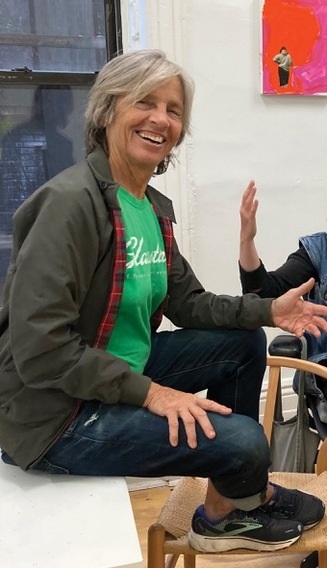 |
|
| photo: Hannah Beerman | |
Eileen Myles is a poet, novelist and art journalist known for first-person vernacular writing in a variety of genres. They are the author of Evolution and Afterglow. In Pathetic Literature (Grove Press), they curate an anthology of 106 pieces, from poetry to prose, that examine pathos and feeling in lesser-known works by the likes of Jorge Luis Borges, Rumi, Kafka and Gwendolyn Brooks. It is the 23rd book Myles has published since the late '70s.
Handsell readers your book:
The world is ready for a book about belonging. Pathetic Literature is unified by being itself while unafraid of seeming way too much or not enough.
On your nightstand now:
Fernando Flores's Tears of the Trufflepig lives on the top of my table by the couch. It is so grounded in a south Texas reality while blasting us into an alternative not-so-future reality that is frightening in its precise detail around what science could do with genetics like even next week. He's such a good writer.
Alice Fulton's Coloratura on a Silence Found in Many Expressive Systems is hanging out there. It's rich, slow, kind of cornered and then flinging-open work.
Favorite book when you were a child:
Little Women. It was the only one that had a female writer, Jo, in it and she had her own room.
Your top five authors:
Violette Leduc who wrote La Batarde, which may be my favorite book about female unloveliness and mother attachment and sophistication and writing. She hovers between poetry and prose like a helicopter.
Maud Martha by Gwendolyn Brooks teaches anyone how to write a new novel. She paces her world step by step, placing feeling in all the cabinets and vanities and grimaces and love. It's a full and entirely alive and delicately strong book. It's a poet's novel, many of my favorite works of prose are.
Henry Miller saved my life by writing about Brooklyn and working-class reality and becoming an artist and writing about sex with such abandon and merging poetry with narrative and sex writing and suggesting women actually like sex. I'm thinking Tropic of Capricorn and Tropic of Cancer.
Can Xue has written Dialogues in Paradise and Love in the New Millennium and many more books. She proceeds with an earnest kind of telling dropping natural surrealism in with a daily philosophy. Her magic as a writer is that she looks really close and reports what she sees. The world is strange and suffering and that fact can produce remarkable results.
I just discovered Sandro Penna, an Italian poet of the 1930s to '70s. He is openly sweetly homosexual and he mixes bodies in with landscape and a relaxed pensive sense of time.
Book you've faked reading:
I pretended to read Crime and Punishment by Fyodor Dostoevsky and I didn't see the need for all the philosophy and ranting but I was pretty young. I never read what I don't want to read now. It's the most free I get.
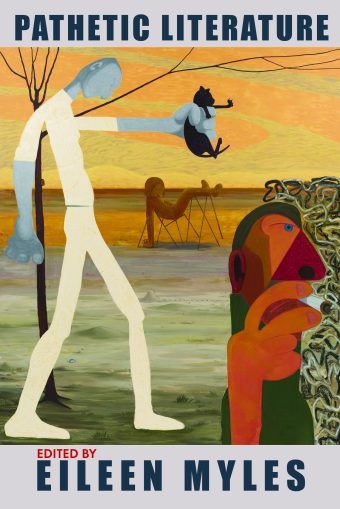 Book you're an evangelist for:
Book you're an evangelist for:
Fifteen Dogs by André Alexis. He created such a simple and exalted premise for a book and then realized it so exquisitely. It's one of my favorite books and when I published my own dog book (Afterglow) I couldn't stop talking about his.
Book you've bought for the cover:
I think there were such books but I don't remember what they were. I don't think they stuck around.
Book you hid from your parents:
I hid Fanny Hill from my mother. It's possible I stole it from my brother, but it was certainly the dirtiest book I had read thus far in my life, which I think was high school.
Book that changed your life:
Yukio Mishima's Confessions of a Mask changed my life. He explored his sexuality in such a poetic magical way and, through our mutual obsession with Joan of Arc, he explained obsession for me by indicating it was what I was doing, and that obsession had a relationship to writing. And reading.
Favorite line from a book:
"I didn't ask to be born," is my favorite line from a book and it is the first line of Henry Miller's Tropic of Capricorn or the first line I remember.
Five books you'll never part with:
Kristín Ómarsdóttir's Children in Reindeer Woods. It's like a wartime fairy tale told in such simple lucid colorful prose.
I will never part with Love by Angela Carter. It's a perfect novella, slightly psychedelic, its portrayal of the '60s almost makes it a historical novel and it's complete yet short.
I will never part with James Schuyler's Freely Espousing because it jingles and paints and does everything writing does in the youngest newest possible way.
I will never give up Carmen Boullosa's Texas: The Great Theft. It's sprawling like the Robert Altman movie Nashville. It's operatic and slips into poetic tales of life and death, it tells about an absolute time at the border before it was and everything was conspiring and breaking.
I will never give up Qiu Miaojin's Last Words from Montmartre, which is like Chris Kraus's I Love Dick, a perfect action of a book. Though in Qiu's case the punctuation on such explodingly well-expressed feeling was to end her own life.
Book you most want to read again for the first time:
Nightwood by Djuna Barnes. It's the most perfect book I ever read though it contains some extremely offensive stuff. It's the same thing with William Burroughs's Naked Lunch which is also a gorgeous abomination.
Books that didn't fit in the categories above:
Samuel Delany's Stars in My Pockets Like Grains of Sand that explained morning in space going around a planet seeing dawn again and again.
Rae Armantrout's Conjure just killed me with its absolute attentiveness to the shifts of consciousness and matter in tiny tiny language.
Edwin Mullhouse by Steven Millhauser because it invents childhood in writing and shows how cartoons invented language.
2666 by Roberto Bolaño is a total masterpiece, especially the frightening middle volume, and I'm glad a man had the courage to write that entirety of what was undoubtedly done by men to these women.
Fred Moten's The Feel Trio is still one of my favorite collections of poetry. It's wildly internal yet full of song.
Book Candy
Book Candy
Mental Floss collected "10 of the oldest pieces of literature."
"When thingummy and whatsit won't do." Merriam-Webster looked up more "words for things you didn't know have names."
The New York Public Library featured "laugh-out-loud book recommendations for kids from the Teen Reading Ambassadors."
Guardian cartoonist Tom Gauld on "break time at the bookshop."
Rediscover
Rediscover: Fay Weldon
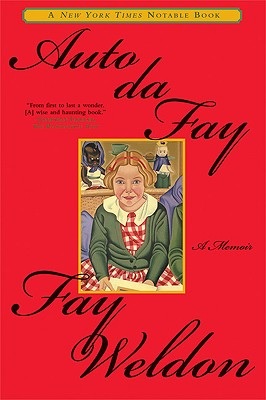 English author Fay Weldon, "who chronicled the ups and downs of British life in novels, TV dramas, plays and short fiction for more than five decades," died January 4 at age 91, the Guardian reported. In more than 30 novels, including The Life and Loves of a She-Devil, Splitting and the Booker Prize-shortlisted Praxis, Weldon "charted lives shaped by class and the sexual revolution.... The sharp dialogue, scathing wit and satirical energy of her fiction were forged in the world of stage and television, where her screenwriting credits included ITV's Upstairs Downstairs and an adaptation of Pride and Prejudice for the BBC."
English author Fay Weldon, "who chronicled the ups and downs of British life in novels, TV dramas, plays and short fiction for more than five decades," died January 4 at age 91, the Guardian reported. In more than 30 novels, including The Life and Loves of a She-Devil, Splitting and the Booker Prize-shortlisted Praxis, Weldon "charted lives shaped by class and the sexual revolution.... The sharp dialogue, scathing wit and satirical energy of her fiction were forged in the world of stage and television, where her screenwriting credits included ITV's Upstairs Downstairs and an adaptation of Pride and Prejudice for the BBC."
Weldon began her career writing scripts for radio and television, contributing to series such as ITV's Armchair Theatre and BBC's Wednesday Play. An ITV drama, The Fat Woman's Joke, would become her first novel, published in 1967. Four more novels appeared over the following decade, as well as a series of plays for stage and screen. Her sixth novel, Praxis, was published in 1978 and earned her an appearance on the Booker prize shortlist. Auto da Fay, her autobiography, was released in 2002.
Weldon's best-known novel, The Life and Loves of a She-Devil, was published in 1983. The Observer called it her "nastiest novel so far... the most mutilating kind of satire, whose only 'point' is to bring you up against the bars of your cage." The BBC adapted the book for TV in 1986, and a film version starring Meryl Streep and Roseanne Barr was released in 1989. The Death of a She-Devil, a follow-up to her 1983 novel, was published by Head of Zeus in 2017.
Author Jenny Colgan, writing in the Guardian, recalled: "Fay was noisy in an era when women were expected to be quiet. She used her voice and took up space; she said what she felt, she brought energy and fun. And she was, as her book festival audiences could doubtless confirm, that very best and most attractive type of person: someone who is utterly, fearlessly and for ever true to themselves, to hell with the consequences. We will miss her."


